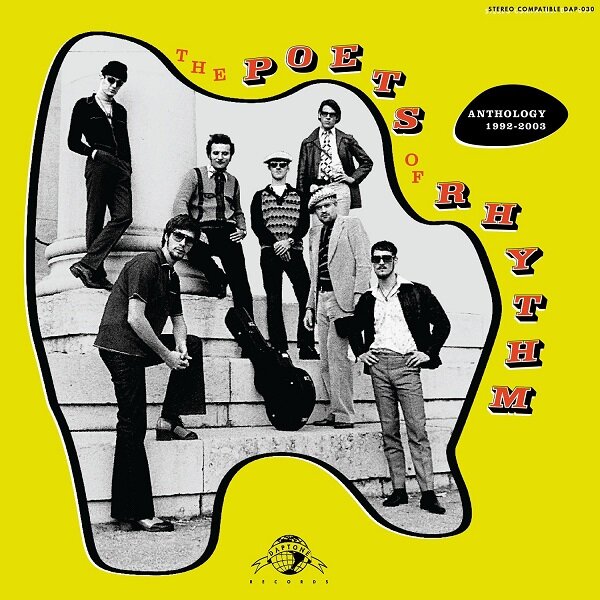Moz on the Doghouse, and Cratedigger Soul

Our favorite things this week include a Millenial listicle, The Poets of Rhythm and This Charming Charlie.
Our favorite things this week include a Millenial listicle, The Poets of Rhythm and This Charming Charlie.
Empty Soul?: In the '90s while America was obsessing over grunge and alternative rock, the German band The Poets of Rhythm pioneered cratedigger soul five years before the first flickers of Daptone Records. As The Anthology 1992-2003 (released on Daptone) shows, The Poets revisited James Brown, The Meters and classic '60s funk just as the Daptone stable would soon after. They, along with The Whitefield Brothers and the instrumental Daptone bands sound like people who came to funk through hip-hop samples. They value the tracks that DJs would value - ones that are funky, evocative and have great texture, but lack the markers of individuality that would make the track easily identified or hard to use. "Choking on a Piece of Meat Pt. 2" sounds great with its jazz flute solo, but it's more interesting for its sound than its content, and if the collection as a whole suggests that they'd agree. Solos are never about assertions of identity on these tracks any more than they are on soundtrack compositions. I love this stuff because it's funky and because its faceless, which makes it great music for work. I doubt that is what The Poets intended. (Alex Rawls)
Making a LIst: We may be at the apex of the Internet's Millenial obsession. Going online these days means dodging the typical article about how lazy twentysomethings are, only to be met with an encouraging column telling aimless young adults to take life by the horns and make art. Any intelligent rhetoric is further drained out by a seemingly innumerable number of Buzzfeed-like articles, milking Millenial posts to the very last click. So imagine my surprise when I came across a Millenial list that I not only clicked all the way through but actually enjoyed. Vulture published its list, "100 Pop-Culture Things That Make You a Millenial" last week, and in a companion explanation, the list's creators show that a surprising amount of consideration and thought was put into the list, explaining
This is not a list of the 100 best, most brilliant, coolest, or highest-quality things that have happened during the Millenial lifespan. That’s an entirely different endeavor; an easier one in some ways. This list is what we talk about when we talk about pop culture.
A lot of people commented to complain, though Vulture was one step ahead by making number 89 on the list: "Whatever You Think Belongs On Here." But it isn't a dump of easily identifiable pop culture tropes. Each entry represents the forces in pop culture that us Millenials have grown up with, aided by that whole World Wide Web thing that pretty much raised us. From The Neptunes to "Since You Been Gone" to "Dick in a Box," the list is, for once, a varied guide to the crazy world in which us young's are immersed. It isn't perfect, and it may reach at times as well as play into some gimmicks, but if this much thought was put into every online attempt to box in a generation, maybe Millenials would be seen as ushers of an unprecedented era of pop culture instead of "the Worst Generation Ever." (Brian Sibile)
From "This Charming Charlie"
Your Music Industry Hates You: This Charming Charlie is, like many tumblr pages, one good joke as its maker Lauren LoPrete puts lines from songs by The Smiths in the voice balloons of Peanuts panels. It's a nice piece of music criticism, drawing a connection between Morrissey and Charlie Brown's ennui, but once you've got it, you've got it. Recently, the page got a new addition - a letter from LoPrete's lawyers to tumblr requesting the reinstatement of entries that were taken down without permission.
Evidently Universal Music Publishing, which administers The Smiths' catalog, considered the uses copyright infringement and went to tumblr, which took down the offending posts. LoPrete's lawyer contended that the lines constituted fair use and were transformative as they created a new work. "They also have no commercial purpose, and cannot have any negative effect on the market for the original works." lawyer Dan Booth wrote. "As a result, the takedown notices are erroneous."
Universal decided late last week to stop pursuing this after the public outcry made them seem humorless, needlessly litigious and tone-deaf. That part of the story is reassuring, but what remains disappointing is the degree to which to music industry has ingrained an adversarial relationship with its consumers. It went after music lovers during the Napster era, and in this case it threatens a Smiths fan who expressed her affection creatively and got people to talk about a band that broke up more than 25 years ago. (Alex Rawls)






